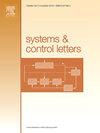线性微分博弈的逆强化学习方法
IF 2.1
3区 计算机科学
Q3 AUTOMATION & CONTROL SYSTEMS
引用次数: 0
摘要
在本研究中,我们考虑了多人差分博弈中的反强化学习或专家玩家成本函数估计问题。我们针对线性-二次方博弈提出了两种在线数据驱动解决方案,适用于满足特定维度标准或成本函数中的未知矩阵符合对角线条件的系统。第一种方法部分不需要模型,利用专家代理的轨迹来解决问题。第二种方法完全不需要模型,同时利用专家和学习者的轨迹。我们确定了解决方案的适用条件,并确定了对所收集数据的必要要求。我们进行了数值模拟,以确定所提方法的有效性。本文章由计算机程序翻译,如有差异,请以英文原文为准。
Inverse reinforcement learning methods for linear differential games
In this study, we considered the problem of inverse reinforcement learning or estimating the cost function of expert players in multi-player differential games. We proposed two online data-driven solutions for linear–quadratic games that are applicable to systems that fulfill a specific dimension criterion or whose unknown matrices in the cost function conform to a diagonal condition. The first method, which is partially model-free, utilizes the trajectories of expert agents to solve the problem. The second method is entirely model-free and employs the trajectories of both expert and learner agents. We determined the conditions under which the solutions are applicable and identified the necessary requirements for the collected data. We conducted numerical simulations to establish the effectiveness of the proposed methods.
求助全文
通过发布文献求助,成功后即可免费获取论文全文。
去求助
来源期刊

Systems & Control Letters
工程技术-运筹学与管理科学
CiteScore
4.60
自引率
3.80%
发文量
144
审稿时长
6 months
期刊介绍:
Founded in 1981 by two of the pre-eminent control theorists, Roger Brockett and Jan Willems, Systems & Control Letters is one of the leading journals in the field of control theory. The aim of the journal is to allow dissemination of relatively concise but highly original contributions whose high initial quality enables a relatively rapid review process. All aspects of the fields of systems and control are covered, especially mathematically-oriented and theoretical papers that have a clear relevance to engineering, physical and biological sciences, and even economics. Application-oriented papers with sophisticated and rigorous mathematical elements are also welcome.
 求助内容:
求助内容: 应助结果提醒方式:
应助结果提醒方式:


